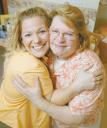


Giving up a child for adoption is never an easy decision. There may be many factors involved in making such a difficult and heart-wrenching choice. However once taken, there is a certain finality to it. The life you brought into this world will be nurtured, cared for, raised and molded by someone else. You will never know the joy and stress of watching and participating in the development of a human being. There will be no first words, no first steps and no first day of school. There will also be no diaper changing, no late night feedings and no runny noses. There will also be no bonding, no caring and no loving. Your birth child will be lost to you forever.
It is not an easy decision to give away a child.The U.S. Census Bureau (year 2000) estimates that more 2 million (2.5% of the child population) children lived with adoptive parents. More than 4 million (5.2%) had one step-parent.
Most adopted children never find their birth mother. Adoption professionals are often wary of reunions. They say happy reunions can be rare. Biological parents often don’t want to revisit memories of an unplanned pregnancy. Adoptees often fear they will learn they share the genes of criminals or substance abusers. However many adopted children are curious about their real parents.
Below are two stories of children who did find their real parents. What makes these stories unique is the fact that they had already met their mothers
and did not know it.
In 1985, 23-year-old Christine Tallady was single and pregnant. Her son was born on Oct. 5. It was a tough decision for Christine to give up her first child for adoption but she said "I wasn't ready to be a mother." She left the adoption record open, hoping that some day her son would try to find her. She often thought about him - especially on his birthday - but eventually she got married and had two more children.
Her son, now named Steve, was adopted by Pat and Lois Flaig. Steve always knew that he was adopted. When he turned 18, he went to the adoption agency D.A. Blodgett for Children and asked for the information on his background. The information he received contained his birth mother's name. He searched for her, for 4 years, using the internet to try to find her address and came up with nothing.
Around the time of his 22nd birthday he took another look at the paperwork form the adoption agency and realized that he had been spelling her last name incorrectly. Her name was
"Tallady" and he had been searching for
"Talladay". He began his search again, this time with the correct spelling and came up with an address less than a mile away from the Lowe's store at which he worked. He made some inquires and found out that she had just been hired at the same Lowe's store a few month's ago.
They knew each other! But he didn't know how to proceed.
It would seem tactless to walk up and say, "Hi, I'm Steve, your son." What if she rejected him?
Eventually he decided to tell the adoption agency that he had found his mother and that she worked with him. An employee volunteered to call Tallady and after receiving the call Tallady recalled:
"It was a shock. I started crying. I figured he would call me sometime, but not like this."
She sobbed a lot that day, tears of joy. Flaig called her later that day, and the two, who until then had occasionally said "hi" as co-workers do, met at the Cheers Good Time Saloon near the store.
They hugged, sat and talked for 2 ½ hours..........

Michelle Wetzell who was adopted when she was 4 days old, wanted to somehow learn her mother’s name and address and mail her a coupon for a free manicure. She wanted to see her mother and learn a little about her, without the threat of awkwardness or rejection.
That was 10 years ago. The memory gives Wetzell chills because of what she learned. She found out her mother had been a co-worker at the Davenport salon, working at the receptionist’s desk, just out of earshot of the stylists and manicurists. Her mother was someone she knew and admired.
“There she was, the whole time,” Wetzell said.
Cathy Henzen, Michelle's mother, found out she was pregnant in 1975 at a time when she was getting a divorce and already had two young daughters. She was living in East Moline and still sharing an apartment with her husband because they couldn’t afford separate homes. Henzen remembers the time around the divorce as the lowest point in her life. She and her husband had heated arguments almost every day. She feared her daughters were being harmed by seeing and listening to the fighting.
“I couldn’t risk bringing another child into this family,” Henzen said.
She decided to place her child for adoption with a nonprofit agency, Bethany for Children and Families. On Feb. 23, 1976, medical staff took the newborn girl away five minutes after she was born.
“It was almost as if they snatched her out of my arms,” Henzen remembers. She wonders if she would have backed out of the adoption if she had been given more time to hold the baby.
Michelle Wetzell was adopted by a couple from Prophetstown, Ill., about 45 miles away. She was told that she was adopted even before she understood what it meant. After graduating from high school, Wetzell moved to Davenport and attended Capri College, a cosmetology school. She got a job doing manicures at Hair By Stewarts. At the salon, she was one of about a dozen young women who did hair and nails. Henzen worked out front, greeting customers and scheduling appointments. Wetzell remembers Henzen as the glue that held the business together with her bubbly personality and her ability to stay cool during busy times.
In the 10 years since leaving the salon, Wetzell moved back to Prophetstown, got married and has a 2-year-old daughter. She works part-time jobs as a bartender at a country club and as a manicurist. Henzen, who is single, left the salon in 1998 and now works as a receptionist for a trucking company.
The two women were reunited because of a medical test that Wetzell had to take to get a life insurance policy. She found out her cholesterol was unusually high for someone her age. The doctor told her that she needed to look into whether her family has any history of heart disease or other illnesses that can be passed on to children.
Wetzell went to Bethany to see if the agency could tell her anything. The agency agreed to help her contact her biological parents. They found Henzen and she agreed to give her medical history and contact information. A case worker at Bethany noticed that Wetzell and Henzen had both worked in cosmetology and mentioned this to Wetzell. This led Wetzell to ask the case worker for more details about Henzen’s job experience. After a few minutes, it clicked. The case worker then called Henzen to tell her the news that her daughter was a former co-worker.
Wetzell and Henzen spoke on the phone later that day. They met a week later at a restaurant, accompanied by Wetzell’s adoptive mother and sister. “Where does it go from here? I just think that we take it a day at a time,” Henzen said.
Henzen said she feels validated that she made the right decision 30 years ago because she can see that Wetzell turned out to be the kind of person anybody would want as a daughter or a friend.
“In my heart I believe I did make the right decision,” Henzen said.

 Thursday, October 29, 2009 at 3:34AM
Thursday, October 29, 2009 at 3:34AM 
 shadmia |
shadmia |  2 Comments |
2 Comments |  Catholic Charities,
Catholic Charities,  Kathy Butler,
Kathy Butler,  Phil Bloete,
Phil Bloete,  Phillip Bloete,
Phillip Bloete,  Ron Ryba in
Ron Ryba in  Adoption,
Adoption,  DNA,
DNA,  Our World,
Our World,  news
news 












